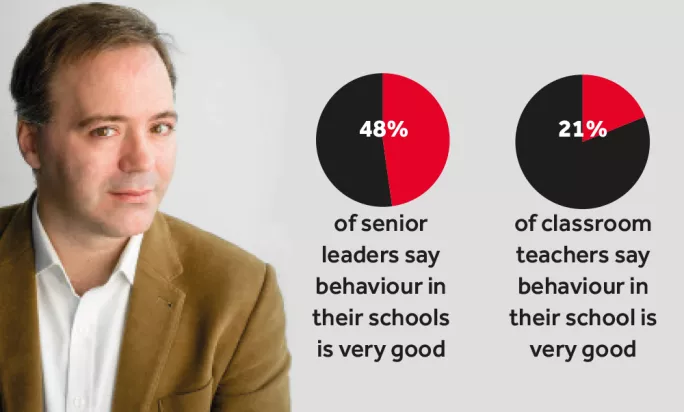Could ‘more muscular units’ help with pupil discipline?

Hazel Pulley said that it was not only the pupils she sent to her school’s internal inclusion unit who benefited from it.
“It enabled other children to live in a more cohesive world, and develop tolerance,” the head at Parkfield Community School, a primary in Birmingham, said.
“For the children who needed it, it stopped them being at home or being placed in special education very quickly. But staff also learned skills in how to deal with challenging behaviours, knowing that there was a place to go if behaviour got too extreme.”
She paused. “But it was underfunded, so we had to close it.”
Now ministers are being called upon to provide funding to enable schools to operate their own internal inclusion units. This is one of a series of recommendations that the government’s behaviour tsar, Tom Bennett (pictured below), has made in a Department for Education-commissioned report published today.
“Cost was often cited by schools as the major obstacle to designing more muscular units of this nature,” the report, entitled Creating a Culture - how schools can optimise behaviour, states.
Mr Bennett said: “There needs to be a safe space within the school where behaviour can be addressed. Where the reasons for misbehaviour can be unpicked.”
He added that he would like the funding to be targeted at the areas of greatest need. “It would be absurd to say that these schools don’t have a need for greater intervention in their behaviour-support programmes,” he said.

Many schools already have internal inclusion units, although the DfE was unable to give figures on how many there were.
A report on the use of these units at several schools in Wales cites the example of one school which established its unit for £300 in a disused store cupboard (bit.ly/InclusionUnit). Staff described it as “not ideal, but the best we had available”.
Ms Pulley said that she appreciated the need to create an internal inclusion unit in a cost-effective way. “But these are children with highly challenging social and emotional behaviours,” she said. “They need a secure environment. We had to make sure the doors had safety equipment around them. You had to have toilets in there. You can’t do that in a cupboard.
“It’s what you do with it that matters. It’s how it’s staffed; that has obvious cost implications.”
Tackling disruption
Mr Bennett was also sceptical about such a low-cost unit. “I don’t think that £300 quote represents a true cost analysis,” he said.
But is it realistic to expect the government to provide more funding for these units in the current financial climate?
Real-terms cuts already mean that schools and local authorities are struggling to provide basic services to pupils. And Mr Bennett pointed out that his report is purely advisory. But he said: “I hope that these recommendations are seen as positive and constructive, and that their financial implications lead to a vast reduction in paying for the fall-out from poor behaviour.”
However, not everyone agrees with the government’s behaviour tsar’s claim that inclusion units are worth the investment. Paul Dix, of behaviour specialists Pivotal Education, helps schools to reach a point where they can manage without such units.
He argues that the units can often prove to be counterproductive. “It’s like the fifth lane of the motorway,” he said. “When you build them, they get filled up.
“If you get the adult behaviour right and the behaviour policy right, you very quickly get to the position where you can get rid of the inclusion unit.”
Mr Bennett’s report also emphasises the importance of a strong culture of good discipline, initiated by the headteacher and running through the school.
It calls on the government to include knowledge of the elements of this behaviour culture as part of any national certification for headteachers.
But Geoff Barton, general secretary-elect of the Association of School and College Leaders, believes that this is unnecessary.
“I’d be surprised if there are any leaders of schools or colleges who don’t already know that, as a prerequisite for learning, you need good behaviour,” he said. “So this does smack of micromanagement.”
You need a Tes subscription to read this article
Subscribe now to read this article and get other subscriber-only content:
- Unlimited access to all Tes magazine content
- Exclusive subscriber-only stories
- Award-winning email newsletters
Already a subscriber? Log in
You need a subscription to read this article
Subscribe now to read this article and get other subscriber-only content, including:
- Unlimited access to all Tes magazine content
- Exclusive subscriber-only stories
- Award-winning email newsletters